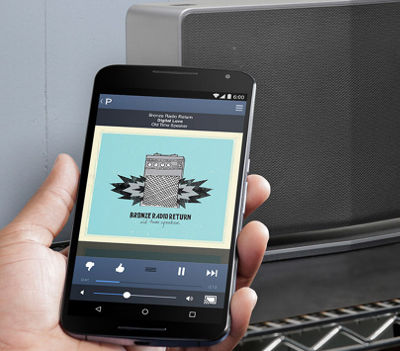| Google Cast For Audio - A Solution? |
| Written by Harry Fairhead | |||
| Tuesday, 06 January 2015 | |||
|
You would think that sending an audio stream to some device so that you could hear it would be a solved problem. Far from it! Google has just announced Cast for Audio based on its Chromecast mechanism. Is this good? The Chromecast was innovative in a number of ways. The first is that it made use of a full WiFi connection to stream data to a USB stick computer. The problem of getting it connected in the first place was solved by letting it host its own WiFi peer-to-peer network. This is a good way to simplify the whole setup problem for ad-hoc WiFi devices and even if it does have some minor security problems it is sure to spread. The second big difference is that the Chromecast isn't a dumb communications device. When you use it to play a video it takes the URL, connects and streams the video independently of the originating device. This means that if you cast a video from a phone the ChromeCast does the heavy lifting leaving the phone to save its battery. The latest extension of the idea is Cast for Audio just announced by Google. At the moment the details are vague and Google seems to be concentrating on engaging the consumer rather than the programmer. The most we can say at the moment is that it is based on Chromecast technology which will be built into Cast Ready speakers which should be available in the spring. It seems Google have companies like Sony LG and Denon in on the deal. Google's promo video is all style and little content:
So you at the very least have to go and buy a new set of speakers to make Cast work. There is no indication on how you would go about setting these up but it is a reasonable guess that you connect to the ad-hoc WiFi network that they create and then provide details using your Android device for input. Once set up the fact that is supposed to appeal to the consumer is that playing something is just a matter of hitting the Cast button. The Google blog states: "Just like Chromecast, simply tap the cast button in your favorite music or radio app on Android, iOS, or the web, and select a Google Cast Ready speaker to get the party started." Presumably this transfers the URL of the music playing on the Android device to the Cast device which then takes over the streaming: "Google Cast Ready speakers pull content directly from the cloud, so you’ll get the best audio quality and can freely multi-task on your phone, tablet, or laptop, all without straining the battery." What isn't clear is whether you will be able to play UPnP, DLNA or just HTTP local media. The full Chromecast can do all of these, but this isn't to say the new Cast for Audio will. However it seems that the "new Cast Ready" apps are simply standard Chromecast apps so it seems very likely that the API is the same and hence you can play anything you like as long as it can be decoded and there is a URL for it. Google is clearly going for the easy-to-use angle and aims to provide some competition for AirPlay and similar. However, we already have a number of ways to play music on remote speakers - why do we need another? You could connect via Bluetooth and stream the audio, and this is the way most mobile users get audio out into the wide world. You can also get Bluetooth adapters that allow you to stream audio into your existing audio equipment. The only problem with this arrangement is the short range nature of Bluetooth and the battery drain on the portable equipment. Then there are the UPnP and DLNA interfaces that allow devices to connect to servers and find out what audio is available and set up streams. Neither of these standards are fully satisfactory and they are both difficult to work with - DLNA in particular as parts of its workings are hidden.
As long as Google Cast doesn't restrict the source of the streaming audio, there is a good chance that it might become a standard way of streaming audio as, currently, there is no good solution to the problem. If the Cast API is essentially the same as the Chromecast API with no additional restrictions, we will all be happy because there is clearly a need for some innovative apps. In fact the success of Cast depends 100% on the quality of apps and how easy they make it to do things that are currently difficult. If you are too impatient to wait you could create something very similar using a Chromecast. As this device needs an HDMI output to work all you need is an HDMI audio extractor/decoder or a TV set that you switch off while listening to the audio. Let's hope that some manufacturer produces a box that lets you add just an audio signal to an existing HiFi and does away with the need to hack a Chromecast, no matter how easy this is. More InformationIntroducing Google Cast for audio Related ArticlesMatchstick - Firefox OS Rival To Chromecast Chromecast Creates Game Opportunities Google Opens Chromecast To Devs
To be informed about new articles on I Programmer, install the I Programmer Toolbar, subscribe to the RSS feed, follow us on, Twitter, Facebook, Google+ or Linkedin, or sign up for our weekly newsletter.
Comments
or email your comment to: comments@i-programmer.info <ASIN:B00DMZOUVK@COM> |
|||
| Last Updated ( Tuesday, 06 January 2015 ) |


